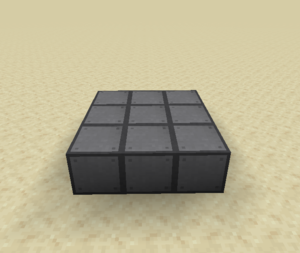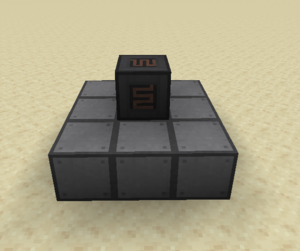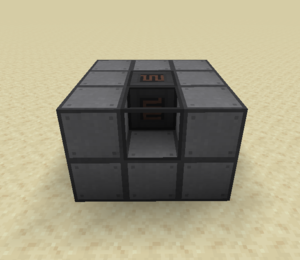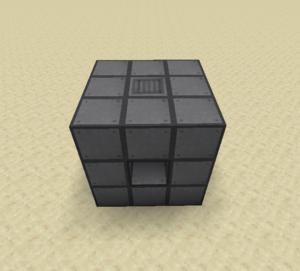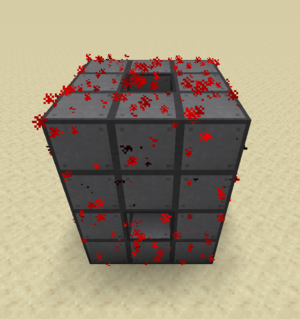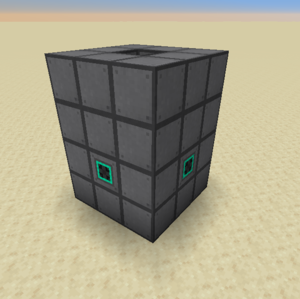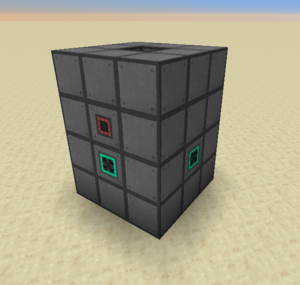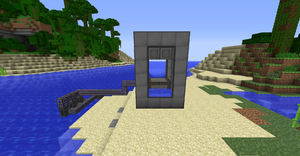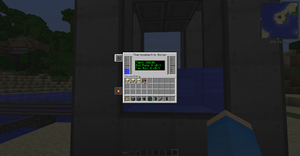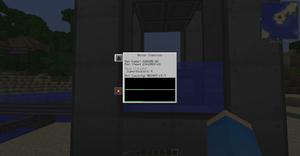Thermoelectric Boiler: Difference between revisions
Marchpersons (talk | contribs) (→Notes) |
SoccPuppet (talk | contribs) (→Notes: YOOO I think I forgot I was editing this page halfway through that sentence) |
||
| Line 86: | Line 86: | ||
==Notes== | ==Notes== | ||
* While it is ''possible'' to supply the heat required with [[Resistive Heater|Resistive Heaters]], | * While it is ''possible'' to supply the heat required with [[Resistive Heater|Resistive Heaters]], it is much more efficient with the heat output from the [[Fission Reactor]] or [[Fusion Reactor]]. | ||
== Video Tutorials == | == Video Tutorials == | ||
Latest revision as of 23:35, 29 February 2024
Please help us by expanding it
The Thermoelectric Boiler is a multi-block structure used to generate steam from external heat. Its minimum dimensions are 3x3x4 (3 long, 3 wide, 4 tall) and its maximum dimensions are 18x18x18, as with Mekanism's other multi-block structures. The heat required is best supplied by Superheated Liquid Sodium from an active Fission Reactor running on sodium cooling, and the steam produced by the Thermoelectric Boiler is used in keeping an Industrial Turbine running.
Construction
This section describes the construction of a 3x3x4 boiler.
| Step | Image | Description | |
|---|---|---|---|
| 1 | Place a 3x3 base layer of Boiler Casings down. | ||
| 2 | Place the Superheating Element in the center of the base. If you are making a larger boiler, you can place additional elements around the center element as long as their sides are touching. (Similar in behavior to the Electromagnetic Coil block) | ||
| 3a | Form a heater layer by placing a 3x3 ring of Boiler Casings around the Superheating Element. You may place Structural Glass on the sides (but not the corners). | ||
| 3b | (Optional) You may form additional heater layers like you did in 3a to increase the water heating rate and the max water capacity of the boiler. | ||
| 3c | (Optional) You may form water cavity layers by leaving the center empty, this will increase the max water capacity of the boiler.
* Note: Heater layers cannot be separated by a cavity layer. Heater layers must be adjacent to each other. | ||
| 4a | Form a steam catch layer by placing Pressure Disperser blocks in the center and Boiler Casings or Structural Glass around the outside. The entire center of this layer must be filled with Dispersers in order for the Boiler to form.
* Note: You can only have one steam catch layer | ||
| 4b | (Optional) You may form steam cavity layers above the steam catch layer by leaving the center empty. This will increase the steam capacity of the boiler. | ||
| 5 | Cap off the the boiler by placing a solid layer of Boiler Casings. You may use Structural Glass in the center. Red particles should emit once this layer is formed, signaling that the inside of the boiler is properly constructed. | ||
| 6 | Replace 2 of the Boiler Casing (or Structural Glass) blocks with Boiler Valve blocks. The valves must be on the sides of a heater layer or a water cavity layer. They cannot be on the edges of the boiler, but they can be on the bottom surface.
One valve will act as the heat input, and the other shall act as the water input. | ||
| 7 | Replace a Boiler Casing (or Structural Glass) block on a steam catch or steam cavity layer with a Boiler valve and change its mode to output by using the configurator. This will act as the steam output. | ||
| Done! | The boiler is now formed. You should attach Mechanical Pipes to the water input and steam output valves, and place Thermodynamic Conductors from your Heater(s) to the heat input valve. |
Showcase of built Boiler
Notes
- While it is possible to supply the heat required with Resistive Heaters, it is much more efficient with the heat output from the Fission Reactor or Fusion Reactor.
Video Tutorials
https://www.youtube.com/watch?v=Zv7XrmVfKN4&t - Tutorial made by Aidan Brady , Developer of Mekanism Mod
https://www.youtube.com/watch?v=WgLGOA9UztI - Tutorial made by MathewCell , updated in version Minecraft 1.7.10 - 1.12 ,
https://www.youtube.com/watch?v=9EgZTwCnWwA&t EsquilãoBR Tutorial PT-BR


